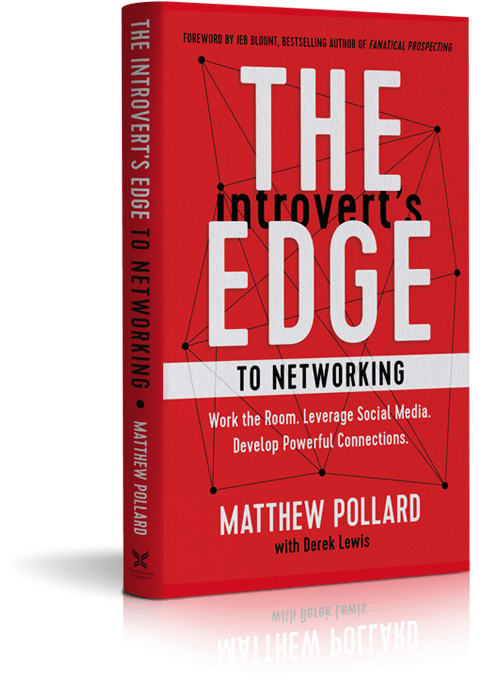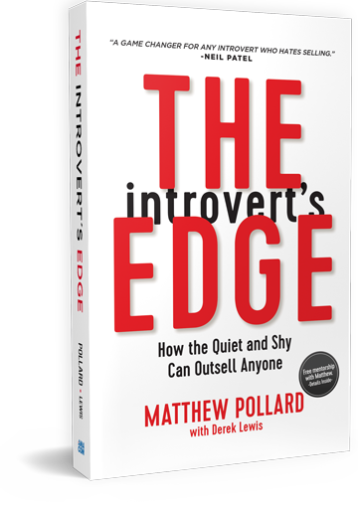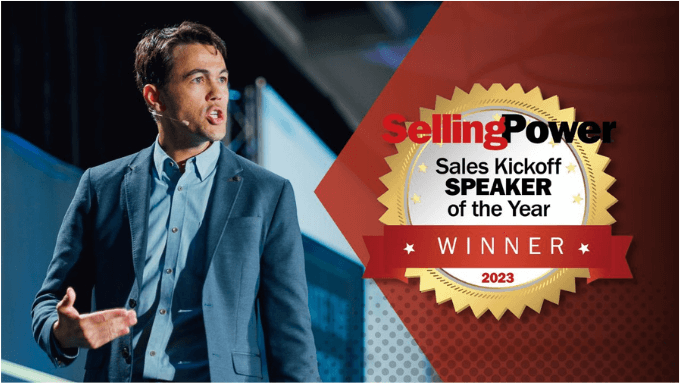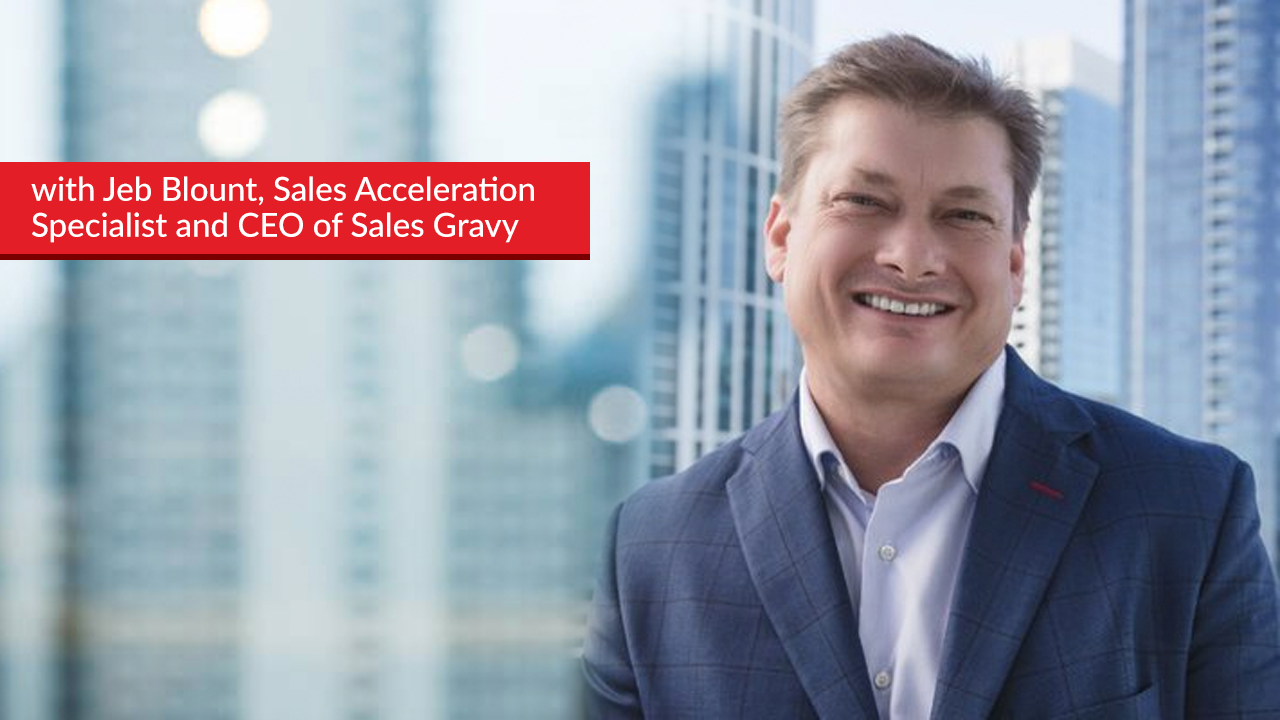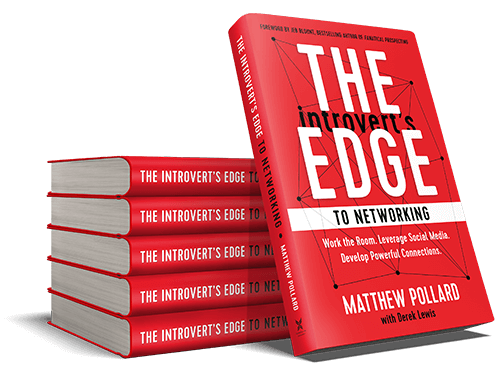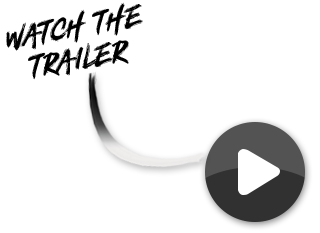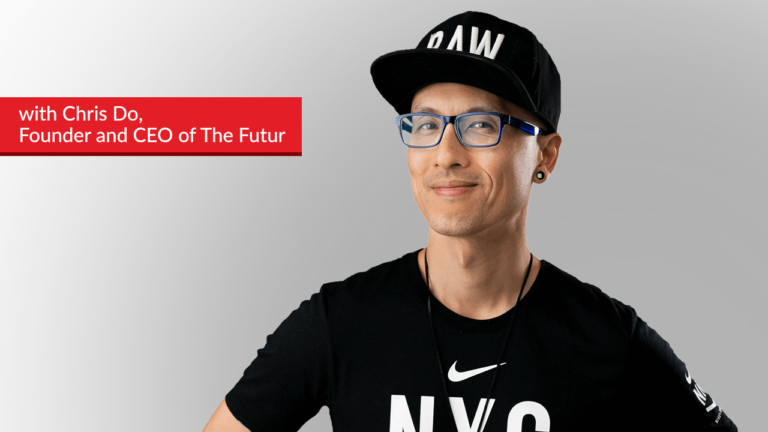Matthew: Hello, everyone, and welcome back to the Introverts Edge podcast. I have to admit I’m really excited about this interview that we have today. I’m introducing you to Jed Blunt, and he’s not only the author of a thousand books on sales that have pretty much all hit the bestseller list. He’s also the founder of a company that has made the Ink 500 and a little bit closer to home.
You might have noticed that he wrote the foreword for my book, The Introverts Edge to Networking, and outed himself publicly as an introvert. So this guy spends his life teaching people how to sell. And as we all know, introverts really struggle to believe that we can. So we’re going to rip that open today as well as talk about pricing, because Jeb’s new book book, is all around how to sell the price increase.
So without further adieu, Jeb, welcome to the show.
Jeb: Well, thank you so much. It’s nice to be back with you. And I always enjoy our conversations. And thanks for that wonderful introduction.
Matthew: It’s my pleasure. And I have to say, I’m excited about the shoe being on the other foot. Right? You’ve done a ton to promote my work, which I’m grateful for. But, you know, I really wanted to spend two days episode. As you know, I’m passionate about helping the world see that introverts can sell. And part of that mission is really about outing other exceptional salespeople.
And I mean, you’re on the global guru list just the same as I am. So because of that, out of you as an introvert, it’s a really exciting topic for me, but also really getting into that personal upbringing story as well is super important. So let’s start by you’ve written about sales, you talk about sales, and everyone knows that sales is the thing that introverts struggle with.
Firstly, I’d love to know what happened as you were growing up to make you decide that you wanted to be involved in sales. And then secondly, was there any struggles that you had that as an introvert you found a little bit harder on you that you had to overcome?
Jeb: Well, you know, the thing about selling for me and when I look at sales sells is a bubble that I live in. So it’s not the rest of my life. And inside the sales bubble, I just have a system and process that I’ve been able to develop over the years that allows me to be successful at a level that most people are not.
And despite being an introvert, but we’ve talked about being an introvert, an extrovert before. In fact, I was having a conversation early this morning with a group from HubSpot on their book club about what person said, I’m an introvert, so I don’t like making cold calls. And what I pointed out to her is I said being an introvert has nothing to do with me getting cold.
Call me if you think about it. Making a cold call for an introvert actually is a pretty easy thing to do because you’re on the telephone, you make the cold call, then you get off and there’s no more investment in the relationship. So it’s not like anybody’s taking energy from me in that moment. I’m just calling up and asking you a simple question Can we meet?
And I found early on, for example, that I was really good at that, where a lot of people, all the extroverts I work with, they were like, I can’t make those calls. I want to go in person and if I need to be there in person. But to me, being in person was incredibly inefficient and I didn’t like it.
Like, I don’t want to go up and I get to do small talk. And on the other stuff I call you up asking for the appointments at the appointment and then I can get prepared for the meeting. What I explained to her was that the reason she was having a hard time making cold calls had nothing to do with introvert or extrovert.
It had everything to do with where she sat on the empathy scale. So she was a highly empathetic person. And when you’re really empathetic, making a cold call you. You ended up projecting your empathy on the other person and said, Well, I wouldn’t want someone doing that to me. I would want them to build a relationship. Not understanding that a cold call has nothing to do with building relationship and everything to do with asking for time.
Again, a system, right? I understand that cold calls asking for time and then sales is asking for a serious commitment. So I learned early on I was 13 years old and I was selling D&D Animal Funeral services from my farm in in Georgia, and that if I just had a simple process, it was easy for me to connect with people, get them to buy for me, and then I could go do my job.
So. So I think that understanding the, you know, the difference between introverts and extroverts is that a lot of the people that I worked with, they would use charm and their their charisma and their their gift of gab to as their sales weapon or sales tool and I used a system and process as my sales tool, and I consistently outperformed them.
And a good way of looking at this is have you ever heard of Suttons law? But Willie Sutton was a lawyer. I mean, a lawyer was a bank robber and a lawyer a bank robber in the 1920s and thirties. And and he was asked by a reporter one time, Why do you rob banks? And his reply, we all know, is, Well, that’s where the money is.
And but there was a a corollary to that. That was later on in that interview where they asked him why use a machine gun to rob banks? And he said, because charm and personality doesn’t doesn’t get you the money. So the same thing for me, like when I when I go into a sales call as an introvert, I recognize that charm and personality is really not my strong suit.
What my strong suit is, is setting myself up to win. So, so early on I latched on to something called Win Probability. I understand how to play the game in a way that gets me in a position where I can win. I learned how to engineer relationships through the sales process so that I’m creating a world where people want to buy from me.
They’re motivated to buy from me within the confines of the sales process. If they met me outside of the sales process, they might not want to buy from me because I typically am a wallflower. So I learned how to do that early on. Now from a you know, were there things I needed to learn how to get out?
Like what? Were there things for me as an individual, as an introvert? The answer really is no. I mean, I think that the the hardest thing for me was learning to just be who I am, because, for example, in my early twenties, I’m learning how to sell it’s go play golf, like go to lunch, go to dinners, go to ball games.
And like, I would rather run my head through a brick wall. You’ve got one behind you and I got one behind me. Then to go to lunch with a client or to go play golf all day long, like I could think of anything worse for me than spending an entire day playing golf, because most of the time I was there, I would want to go someplace else.
And I don’t mind client dinners so much, but I mean, it just wasn’t like a like, that’s not how I sold, but that’s what the expectation was. But what I learned, though, is that none of that really mattered. Like, if I could if I could, in the confines of the sales process, I could cause the customer to want to be motivated to do business with me because they like me and it’s easy to be likable when you listen to other people.
That’s a simple thing to do, and I’m able to solve their problems. That’s what a process allows you to do to get do good discovery so that can understand what’s important to them and build a value bridge that that I could win. And it didn’t make a difference if I took them to lunch or not. In fact, I could outperform everybody if I could do those things.
So the hardest thing for me, if you think there’s one thing I had to get over with it was that guilt or that self-doubt of of feeling that I wasn’t doing what I should have been doing because I wasn’t I wasn’t good at those things. And that was like, you know, for me personally, that was like a 20 year journey of finally coming to maybe, maybe I’m still there where I still feel guilty, but I just don’t feel like I motivated to go have lunch with people or play golf with me.
I just don’t have it. And I just had to accept that’s who I am. I’m not going to do that. But there’s a better way. And I think that I think that, you know, by the trophy case, I have full of trophies in my income. You know, long term has been driven by the fact that systems and processes work way better than charm and personality.
Matthew: I think that’s really great advice. And I think what I’m hearing constantly is I spend my energy on the things that allow me to be better at the thing that otherwise would be uncomfortable as opposed to the activities that I’m not going to enjoy, that the extroverts are going to be better at anyway, like going to golf and having those luncheons and things like that.
Which, you know, I will say upfront, Well, I’d love to dig deeper into that. We Jim has interviewed me twice on his show, which is called Sales Gravy or the Sales Gravy podcast. And we go into depth into both of these topics. As a matter of fact, in his own university, there is a whole load of training around us talking about the things we won’t do and the things we will do when it comes to the activities and all of it by using process, allows us to sell better than the average sales, the better than the average extrovert, and a lot of the introverts that are just winging things as well because they don’t know
how to do anything differently. And we get to do it the way we want to do it. So I think that one of the things that’s really interesting about what you just said, though, is you talked about apathy as opposed to introversion. And I think this is an important point because I spend my life helping people realize that introverts are not.
Second class citizens. That path to success is just different. But once people are armed with that, that doesn’t mean that just because you can, that you will. So because of that, I’d love to just delve a little bit deeper into that. And if you were an introvert watching this for the longest time, you said I couldn’t sell and now you picked up a copy of your book or you watch some programs about how to sell.
That doesn’t mean that you’re actually going to do the work when it comes to applying it out in the real world and doing that legwork, it’s necessary to have a rapid growth business that you love or to pursue a great sales career. So if you were the person listening that has never put real energy behind these activities, how would you suggest they get out of that apathy problem?
Jeb: Well, I think I go back to if like if you’re uncomfortable selling, it is not because you’re an introvert, it’s just you’re blaming it on introversion. But it’s not that typically you’re uncomfortable selling because you’re afraid of rejection. And that is not the same thing as an introvert. I’m not afraid of rejection. I just don’t like being with people.
I mean, I really the pandemic has been the greatest experience of my life. I mean, I know this sounds kind of cold, but Lord have mercy. I get took all the pressure off me to hang out with people. I got to just do me. But but I love selling. I love making income. I love closing deals. I love the game.
I’m not afraid of being rejected. I don’t like being rejected. Don’t get me wrong. But I’m not afraid of it. And I’ve and I’ve developed frameworks and systems and processes to get past that. And in fact, as an introvert, me personally, I’m much more of an outcome driven person than I’m an empathetic person. There’s just a there’s this a difference in personalities, and that’s baked into who I am.
But like, I mean, sitting around and I had a big party at my house during in early February as part of a club that I’m involved in. I’m so much happier when people don’t talk to me and I can just watch the party from afar and enjoy them. Then. Then when people are trying to engage me in conversation, it completely drains me.
It just it just it actually ruins my experience. That’s but that has nothing to do with fear of rejection. It has everything to do with it. Just who I am and what I, what I what I enjoy. So what I would say to you is, if you are a person, you’re a business owner and you say, I don’t like sales, well, I would look inside.
Deep inside I’ll look in the mirror and ask the question, Why don’t you like it? You’re using introversion as a crutch for your fear of rejection. Now, that fear of rejection is real. It’s it’s not something that like is a psychological problem for you. You truly don’t like being rejected, nor does any other human being on Earth other than maybe sociopaths.
And the reason that you feel that way is that you understand that the you you know, where the lines are drawn. You understand that that not pushing people too far allows you to work better in teams and in groups and build better relationships. All of that matters. But the fact is, is that true? Selling means that you have to go out and find rejection and bring it home.
And it means that there isn’t a way around it. There’s no way under it. There’s no way over it. And you can’t go backwards. You just have to deal with it and move forward. Now, the best way of dealing with it is actually do it. So is something called obstacle immunity. So the more you face rejection, the easier it is to deal with rejection, The more you recognize that when you approach rejection with relaxed, assertive confidence, rejection typically will lean into you and it makes it easier for you to get the other person to to to listen or to pay attention or to engage and answer your questions.
And it makes it easier for you to engage them. So I would begin there. And when you look in the mirror, recognize that the problem is, is that you’re afraid of rejection. You don’t want to be to pushy. You don’t want to seem like like you want to be a person that other people don’t want to like. That has nothing to do with introversion.
I’m an introvert. I don’t care if people like me are truly I don’t care. And I know that’s weird, but I just don’t because I’m happy alone. And my wife, by the way, is an introvert. She said to me the day ago, she goes, You know what? I don’t need other people, period. Like, I don’t even need you.
I’m happy here. Like I’m all by myself. These hurt my feelings. You said that, but I’m good because I was worried about that. I was like, Are you going to be okay? I’m going on trip. You going to be alone? So so the thing that I would say to you is it’s that you’re using introversion as a crutch.
And, oh, by the way, you also may feel like because of what you’ve learned or seen about cells over the years, like me, I have to get used to the fact that I just going to lunch with people and hobnob being that’s just not my style. You think that you need to have gift of gab, You think that you need to be really, really good with people in order to sell things.
And so that becomes a crutch as well, because you’ve got this mental image of what you think selling is. And inside of you, everything is screaming. I don’t want to do that. I get that start with rejection, though. That is where you sit on the empathy scale. So if you’re a person, let’s say, for example, Matthew, you and I are having a conversation.
You’re my customer and I need to ask you to meet with me again so I can do a proposal. If in that moment, for example, you’re a business owner and that’s a moment of truth where typically in somewhere inside of your brain, you’re thinking to yourself, I don’t want to be too pushy. And, you know, maybe, maybe if I’ll just kind of leave some awkward silence and Matthew will do the job for me.
And a lot of your meetings end up in these sort of wishy washy years. We’ll get back together at some point in the future. If you’re if you’re having that conversation with yourself, you are higher on the empathy scale, which means that it’s easier for you to feel what Matthew is feeling. And by the way, my wife is a total introvert and high on the empathy scale.
I’m a total introvert and I’m low on the empathy scale. I’m more outcome driven. So we’re the complete opposite that way, although we both share the fact that we prefer to be alone, which is fine. So if you’re there, what you need to do is start being intentional about outcome. In other words, as you’re dealing with the customer, you need to create a system that allows you to decide in advance what you’re going to ask for.
Sometimes you need to practice it, but you need to know, like, here’s what I’m going to ask for at the end. So that when you get to the end, your brain says, okay, this meeting is not over until I ask Matthew to meet with me again so I can do the proposal. By the way, if you’re an introvert and you are, you know, low on the empathy scale, in other words, you’re more outcome driven like me, which means you’re you’re typically more self-centered in those situations.
You need to be more intentional about empathy. So you have a tendency to blow up your relationships because you go in and talk at the person, right? You put the emotional wall up because that’s how it feels. And and so and I’d go, Matthew, you want to meet, you know, again you go to the proposal and he goes, Yeah, not really, because I’m just not that into you because you’re a putz, right?
So, so you own e just either side of the scale. You need to be intentional about those things. On the other hand, if you’re if you’re like me, you were the introvert who said I’m supposed to do these things. I feel guilty because I don’t want to it it creates a level of anxiety and stress inside of me that I’m and it’s hard to put that into words how I feel.
But I, I’ve constantly have this like guilty feeling where I like I example I was I was I did an international keynote last week and I had a client who asked me to go to dinner the night before. I’m getting ready for the event. And you and I’ve talked about this before and some of other conversations. And actually since that conversation that we had, by the way, almost like going to my therapist is hanging out with you.
I’ve gotten way better at it. Like they sent me a text message. So normally I’m wracked with guilt. Like I they want to have dinner with me. I don’t really need to have dinner right now. I need to go sit by myself in the dark room, because tomorrow I’m delivering a two hour keynote to an international audience of sales people who are starving to meet with me.
And I need to be my very, very best. And they’re going to take all my energy into the of like, crap. And I’m going to be like, instead of doing all that, I just wrote back and said, How about tomorrow night? Because tonight I need to prep like I was just I was intentional about what I was going to ask for.
Prior to that, I would have just been wracked with guilt and I probably would have caved and said, okay. And then I would have felt terrible the entire time around. A bad experience. I wouldn’t like myself very much. The next morning I wake up because they stay out too late and I’m just everything’s wrong. I’ve gotten better at that.
That’s what I mean about being intentional. But but overcoming that, I think a lot of I think I just believe a lot of introverts feel this way, that internal guilt and struggle inside of I’m supposed to be this person, but I don’t know how to be that person. Absolutely letting go.
Matthew: They absolutely shouldn’t be. And I think that this is one of the important things that you constantly be thinking. I mean, there are studies to say that people deem rejection the same as being spanked. Now, the truth is it doesn’t hurt, especially if you learn not to take it personally. And Jeb and I both talk about focusing on sales system ization, networking system ization, public speaking system ization.
Gosh, every part of my business and I know James is focused on systemize ation which takes the personal rejection out of it any way. So if you learn to focus on system, it’s going to remove a lot of that problem of feeling like that. Rejection is because of you. And the second piece of advice, and this is key is desensitizing yourself to the conversations you need to have.
You know, I talk frequently about going if you need to talk about price, you need to talk about the price before you go into the conversation, practice in the nursery to your wife, talk about it over and over again so you don’t get uncomfortable when you’re mentioning the number. It is so vital that you do these things and then listen to other introverted coaches, the other introverted specialists.
Jeb just highlighted that a conversation that he and I had on his podcast led to him feeling comfortable saying love to just not tonight, go tomorrow night, because that’s a skill set that I learned. By the way, that skill set I learned from another person called Dorie Clark, who was on the Introverts Edge podcast, who said, This is what I did because I kept getting asked to speak and I felt totally guilty that I had to say no when they were paying me all this money.
So I decided to do this instead. So by understanding that we have benefits and disadvantages and a lot of those disadvantages not only can be fixed by system ization, but actually allow us to outsell out network our extroverted counterparts, then all of a sudden we can start stop feeling so guilty. And especially if we’re high on the empathy scale, stop wracking ourselves with guilt because of something that they don’t even probably care about.
And probably just in Jeb’s case or my case probably felt a lot more comfortable with not going to dinner because they’ve got to go to an event tomorrow, too. I would probably just high empathy feeling like pull Jeb’s by himself tonight. Maybe I should take him out to dinner. You don’t know what happened. So it’s so vitally important.
We learn from others and we learn strategies so that we don’t get affected when something like that is uncomfortable because it shouldn’t be. Now, one of the things I will highlight is that if you have a customer, there’s so many people out there right now that are used to having customers that may not have accepted their price and they had a discount originally, or they know now that they’re being they’ve been under charging this person for years.
And because of that, they have to had that conversation about, you know, how you I charge you this much per hour or this much per thing last week, last year. Now I’ve got to put my price up. Now we’re about at all the time we have today, but we’re going to be interviewing Jeb again on the quietly influential summit.
So if you haven’t registered yet, make sure you register. It’s a free event and you’ll be able to hear from experts like Jeb and so many other introverted specialists and experts that happen to be introverted on amazing topics like this. But one what I would love you to do is touch on one major value bomb or something, because I know you’ve written a book on this topic.
I mean, your new book, Selling the Price Increases, obviously actually just coming out at the moment. So if you haven’t yet, pick up a copy of that book. But Jeb, give us one quick inkling of some of the things that people need to be thinking about when it comes to the price increase. And then we’ll follow on to that in the summit interview.
Jeb: Yet the book selling the price increase is, I can say this confidently, the most comprehensive book that’s ever been written on selling B to B price increases because it is the only book that has ever been written on selling B to B price increases. Like nobody’s ever taken this on. And I’ve been doing price increases since I was, you know, 20 in my twenties.
I remember my like my boss coming in with a list and saying I need to get a 6% net price increase. Here’s a list of customers. Go see them and me going, Well, you know, you got to be kidding me. I don’t do that. I like giving discounts, but I want to give, you know, a price increase. And it turns out that sales professionals and business owners have a deep psychological aversion to price increases because it just strikes fear in our hearts, because we’re afraid that we’re going to get into a confrontation that is something introverts do not like.
I don’t want to be in a confrontation. It will it creates an opportunity for the customer to tell you that your service stinks, personal rejection, and it also creates an opportunity for them to throw their alternatives are doing business with you and you’re in your face and say that, well, they’re going to, you know, buy from someone else.
So back to system and process. What I built was a step by step, complete system from the top to the bottom, from practice, from getting ready for it, from from understanding the risk profiles of the accounts before you go in to the different ways that you might approach them from defending a non-negotiable price increase to approaching customers where there is a no negotiable price increase, even to getting into your largest strategic accounts, where there’s a lot at risk and a lot of revenue at risk.
But like you said, in a lot of cases, the you brought those those clients in at a really low price because you want to win the deal and now you’re not making as much profit. So how are you going to raise your prices down the road? I built the entire system from hello to closing the deal to dealing with objections to getting even negotiating price increases and really, really, really, really, really excited and proud about this book.
I told you earlier in the pre-show, it almost crushed me to write this thing because I had to put so much into it. But but these the I’m just I just finished doing the reread through the entire book. And you’ve never read anything like this when it comes to price increases. It’ll give you everything you need.
Matthew: Well, I can’t wait to read it, and I’m hoping to get it a little bit earlier than everybody else. But I know from from Jim’s other books, he doesn’t really hold back at all. So many people spend fortunes on programs, and I can tell you that what Jim covers in his book is usually very, very systematic. And because of that, that’s I mean, that’s exactly what I see introverts need, right?
So definitely check out the book and make sure you check out the the other interview that we’re going to be doing inside the quietly influential summit, where we’re going to actually go deeper into selling the price increase. So make sure you check out that episode. And again, that’s free by joining the summit at the quietly influential summit dot com.
Now, before we go, I have to ask Jeb the question that I ask every single one of my guests before they get off this show is Jeb. What do you consider your introverts edge?
Jeb: It’s the ability inside the the the bubble of selling. I’m I’m terrible outside of selling, but I have the ability inside of selling to. You said this word earlier, but I’m not quite sure if I can repeat it in my head. But it’s the ability to desensitize the cells conversations. When I’m in that space, I’m like, I’ve got my superhero powers in when I’m selling outside of that, I’m a disaster.
But inside of that, that’s where that’s where I’ve just have all my confidence because I just have a system that I believe in that gives me a high probability of winning. So I’ve got all the confidence in the world.
Matthew: You know, I think that what you’re hearing from Jeb is that he learned from a young age and he built on that skill over and over again. You all know my story. I started with 93 doors of rejection, but I studied YouTube videos and I worked every day, sometimes hours more than anyone would ever want to do for themselves.
But six weeks later, I was the number one salesperson in the company, and I’ve built on that every single day. This fear of rejection, this belief that interruptions in your way is stopping you from creating the foundational skills that you’ll then be able to build on over and over every single day to allow you to have the life that you want.
And once you realize how simple those skills are and how methodical it is, which is designed specifically for introverts, you wish you started when you were 16, like Jeb when you were 18, like I was. Don’t stop yourself from learning the skill that allows you to lead the life that you deserve. But for today, I want to thank every single person for joining me on the Introverts Edge podcast.
And Jeb, thank you so much for sharing so much value with my audience today.
Jeb: Thank you for having me on.







